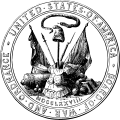History
During Sherman's Atlanta campaign in 1864, his Army Group was composed of the Army of the Tennessee, the Army of the Cumberland, and the Army of the Ohio. After the fall of Atlanta in September, Sherman sent the Army of the Ohio and the IV Corps of the Army of the Cumberland north to deal with the remnants of Lt. Gen. John Bell Hood's Army of Tennessee. Then, on November 7, 1864, he created the army soon called Army of Georgia by combining the remaining XIV Corps and the XX Corps of the Army of the Cumberland. [1] This new army, placed under the command of Maj. Gen. Henry Warner Slocum of the XX Corps, served as one of the two wings in Sherman's March to the Sea. [1] The Army of the Tennessee, consisting of the XV and XVII Corps, commanded by Oliver O. Howard, served as the other wing. [3] The Army of Georgia was involved in little fighting during the March to the Sea but was engaged in the Battle of Averasborough and bore the brunt of fighting at the Battle of Bentonville.
This page is based on this
Wikipedia article Text is available under the
CC BY-SA 4.0 license; additional terms may apply.
Images, videos and audio are available under their respective licenses.
